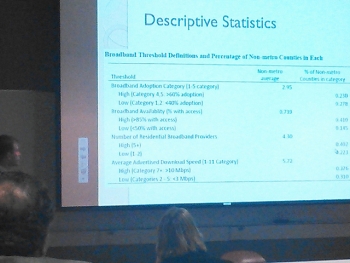Frequently Asked Questions About Broadband Internet

Broadband has completely revolutionized the way we use the Internet. Not so long ago, almost everyone accessed the Web through painfully slow 56.6Kbps dial-up connections. Today's Internet speeds are many times faster than this with the latest fibre-optic cable broadband offering speeds of up to 100Mbps. This is almost two-thousand times faster than the connections we were stuck with little more than a decade ago. Whether you are thinking about changing over to a new broadband provider or simply want to better understand the subject, the following frequently asked questions about broadband should help to clarify things for you.
What Is the Difference Between Wireless-G and Wireless-N?
Wireless Internet, also known as Wi-Fi comes with a number of different specifications and today, the most common are 802.11g and 802.11n or wireless-G and wireless-N respectively. Older 802.11a and 802.11b specifications are also still in use in some rare cases. Wireless-N is the newest specification, providing improved range and maximum attainable speed. All newer specifications are backwards compatible with older ones but, in order to take advantage of the new technology, both your router and network adapter need to meet the same specification.
What Is Mobile Broadband?
Mobile broadband, not to be confused with Wi-Fi, is broadband Internet that uses the mobile telephone networks and hence works everywhere where you can receive a mobile phone signal. Currently, 3G or third generation mobile broadband is by far the most common around the world, offering download speeds of up to 8Mbps. 4G, the latest generation of mobile broadband, is currently being introduced in the UK and many other parts of the world. You can access mobile broadband from any computer as well by way of a special USB dongle.
What Is the Difference Between Cable and ADSL Broadband?
Cable broadband uses the same networks as cable television and is widely available in many urban areas. Also becoming increasingly available is fibre-optic cable broadband which offers the fastest available download speeds in the world today. ADSL broadband, by contrast, uses existing phone line infrastructure and is available across most of the UK as well as other countries. ADSL is by far the most common kind of broadband.
How Can I Get Broadband Where ADSL and Cable Are Unavailable?
Even if you have a phone line, you might still not be able to get broadband Internet using ADSL if you live a long way from the local exchange or the necessary infrastructure has not yet been upgraded. If this is the case, your only options for fast Internet include mobile broadband provided you can get a strong mobile phone signal in your area or satellite broadband which is available anywhere in the globe. Unfortunately, however, satellite is often expensive and subject to high latency rates.
What Is Latency?
Many novices confuse latency with download speed when they are, in fact, quite different things. The latency rate refers the time it takes for data to complete a round-trip between you and the remote computer that you are connecting to. Latency is particularly important in online gaming and live voice and video calls. Even if you have a very high burst download rate, your connection will lag significantly if your latency rate is low. The latency rate also depends equally on the webpage or other remote server that you are connecting to. Latency is measured in milliseconds. When playing games online, for example, you will typically want a latency of no more than 100ms.
How Is Broadband Speed Measured?
Broadband speeds are usually measured in megabits per second although the dial-up speeds of old were measured in kilobits per second. Many people initially get confused by megabits and megabytes and it is important that they are quite different. One megabyte consists of eight megabits and the latter measurement is always used when referring to download and upload speeds of Internet connections. The former is used only when referring to digital storage space. In the end of 2012, the average download speed in the United Kingdom was around 7Mbps. This is fast enough to download, for example, an average-length MP3 song in around eight seconds. The fastest connections in the UK are 76Mbps or even higher but they are not yet widely available.
